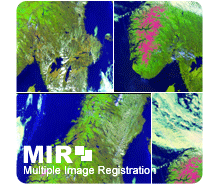Multiple Image Registration (MIR)
Multiple Image Registration (MIR)
Co-registration of time-series imagery
The study of time series of satellite images is an important task in many remote sensing applications where the objective is to study different environmental phenomena. For such applications a co-registration of the satellite images acquired at different times are important. Automatic techniques for performing each step of the process do exist, but there is no one registration technique that works equally well for all image types. The selection of the appropriate method depends on the application and the image specifics. Consequently there exists a large number of different automatic registration techniques, all of which essentially perform the same task, the only difference being that they are constrained to working with a very small range of images. The objective of the MIR project is therefore to develop a tool for automatic co-registration of images that is of a more general nature and can overcome some of these problems.
The idea has been to develop a system that includes a number of different co-registration approaches, and which is able to automatically choose the most appropriate methods based on image characteristics. A number of different co-registration methods have therefore been included in the MIR tool by selecting and integrating existing methods and software tools. In addition, functionality for extracting and analysing image characteristics and for automatically deciding on the appropriate set of methods to be applied for each problem is developed. This latter functionality is the key feature of the software. Both the regions of the image to be used for the co-registration and the registration approach to be used are automatically selected. A novel approach providing such an adaptive strategy has been developed and implemented by NR in a first version of an adaptive image registration tool.
The software tool was developed in the initial project period (2004-2005). Through a continuation of the project (2006-2008) the system has been validated, improved and extended. Larger-scale experiments have been carried out in addition to tuning and training of the methods, based on larger data sets. Finally, an implementation of a multi-resolution strategy has been included and the software solution has been integrated in ESA'a software framework KEO.

Project period
Financing
ESA


 How to get to NR
How to get to NR Share on social media
Share on social media Privacy policy
Privacy policy